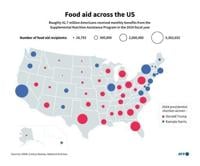
(Photo by Anastasia Shuraeva via Pexels)
Catching bugs and making little houses for them, obsessions with the door stopper and a fascination with elevators and how their buttons work are some of the most interesting curiosities today’s youngest children have, according to new research.
A survey of 2,000 parents of children ages 0-6, looked at some of their most unique interests and revealed that some find that their child is most fascinated by the natural world.
This includes things like rainwater, worms, the weather and specifically “extinct fish,” while other children's interests are more nuanced, such as knights and drums.
Interests aside, parents find that their child’s curious nature comes through in other ways. On average, parents navigate 46 questions per day, though they find themselves without an answer 35% of the time.
That’s no surprise considering some of the questions they field. Results uncovered some of the strangest ones, including: “If time had a smell, what would it smell like?”, “How long can a hippo run faster than an elephant?” and even “Where do dreams go when we wake up?”
Most often, parents’ initial reaction to these questions surrounds where they came up with them (52%), while others seek out the answer with their child (42%) or find some information on their own (27%).
This may be because more than nine in 10 parents polled (91%) say that it’s important to encourage their child’s natural curiosity and interests.
Still, parents find themselves saying “be careful” an average of 27 times per day and “don’t touch that” an additional 25 times.
Conducted by Talker Research on behalf of Lightbridge Academy, the survey explored how parents are trying to walk the line between keeping their child safe while still fostering their innate curiosity and resilience.

(Photo by Ketut Subiyanto via Pexels)
Almost every parent (97%) underscores the importance of their child understanding why they told them to “be careful.” More than half (55%) have that conversation immediately following the incident, while another 30% follow up within a few minutes.
Yet almost two in five parents polled (38%) admit they frequently lie awake at night, worrying about how they handled things and whether their child understands their explanation.
For most parents, that “why” aligns most closely with trying to help their child build safe habits (57%).
For other parents, telling their child to “be careful” is just a gut or reflex reaction (45%) more than it is because of actual danger (34%).
“Today’s parents are juggling a lot,” said Gigi Schweikert, CEO of Lightbridge Academy. “It’s no secret that they worry about their child’s safety, 75% of parents say they’re concerned on any given day, yet these well-meaning instincts may unintentionally hinder the curiosity and resilience they’re hoping to instill in their children.”
Nearly all parents polled (97%) would describe their child as curious and 71% of those would go so far as to say their child is “very curious." Another 77% would even believe that their child is more curious than they were at that age.

(Talker Research)
When they were growing up, parents polled most often heard the phrase “because I said so” (61%).
Only about half (49%) admit they had a positive reaction when they heard this response.
But today, approaches are changing. Only 22% often say “because I said so,” and “be careful” (71%) is most common.
This shift is for the better, as three-quarter of parents polled report positive reactions from their child.
“Even before they’ve stepped into a classroom, parents can see early sparks of curiosity and creativity in their children — passions that can one day grow into future careers,” said Schweikert. “In fact, 92% of parents say it’s important for their child to develop STEAM skills, which can be nurtured in countless ways. By encouraging exploration and hands-on learning, parents are helping raise the next generation of resilient thinkers, innovators and scientists.”

sofatutor
Survey methodology:
Talker Research surveyed 2,000 parents of children ages 0-6; the survey was commissioned by Lightbridge Academy and administered and conducted online by Talker Research between Oct. 8 and Oct. 15, 2025.
We are sourcing from a non-probability frame and the two main sources we use are:
- Traditional online access panels — where respondents opt-in to take part in online market research for an incentive
- Programmatic — where respondents are online and are given the option to take part in a survey to receive a virtual incentive usually related to the online activity they are engaging in
Those who did not fit the specified sample were terminated from the survey. As the survey is fielded, dynamic online sampling is used, adjusting targeting to achieve the quotas specified as part of the sampling plan.
Regardless of which sources a respondent came from, they were directed to an Online Survey, where the survey was conducted in English; a link to the questionnaire can be shared upon request. Respondents were awarded points for completing the survey. These points have a small cash-equivalent monetary value.
Cells are only reported on for analysis if they have a minimum of 80 respondents, and statistical significance is calculated at the 95% level. Data is not weighted, but quotas and other parameters are put in place to reach the desired sample.
Interviews are excluded from the final analysis if they failed quality-checking measures. This includes:
- Speeders: Respondents who complete the survey in a time that is quicker than one-third of the median length of interview are disqualified as speeders
- Open ends: All verbatim responses (full open-ended questions as well as other please specify options) are checked for inappropriate or irrelevant text
- Bots: Captcha is enabled on surveys, which allows the research team to identify and disqualify bots
- Duplicates: Survey software has “deduping” based on digital fingerprinting, which ensures nobody is allowed to take the survey more than once
It is worth noting that this survey was only available to individuals with internet access, and the results may not be generalizable to those without internet access.

























(0) comments
Welcome to the discussion.
Log In
Keep it Clean. Please avoid obscene, vulgar, lewd, racist or sexually-oriented language.
PLEASE TURN OFF YOUR CAPS LOCK.
Don't Threaten. Threats of harming another person will not be tolerated.
Be Truthful. Don't knowingly lie about anyone or anything.
Be Nice. No racism, sexism or any sort of -ism that is degrading to another person.
Be Proactive. Use the 'Report' link on each comment to let us know of abusive posts.
Share with Us. We'd love to hear eyewitness accounts, the history behind an article.